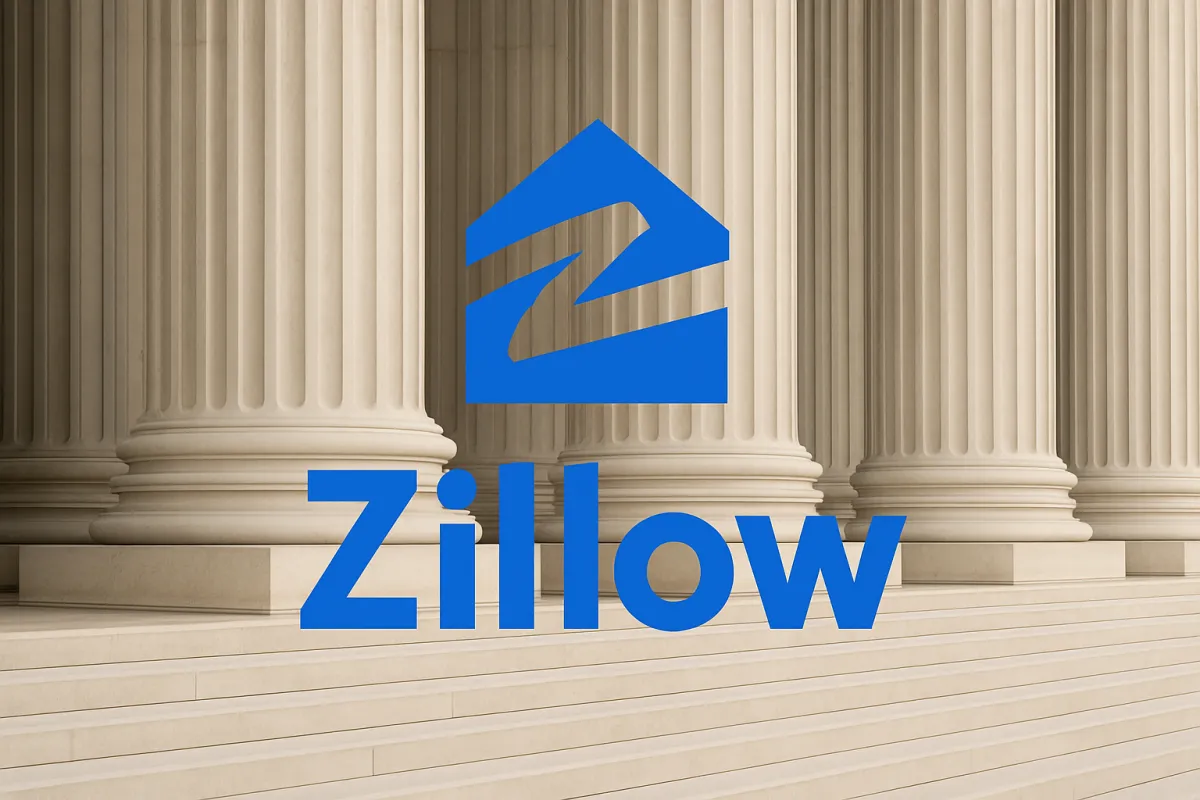
Zillow Legal Headwinds 2025: Lawsuits, Policies, and What It Means for MA & RI
Zillow isn’t just a search site; it’s the front door for a huge share of consumer discovery. That’s why the recent pile-up of legal and policy moves around the company is more than court drama—it’s a preview of how listing exposure, lead routing, and buyer representation may evolve over the next few quarters.
I know… this article is probably pretty heavy for a real estate blog aimed at keeping my clients informed about what’s happening in real estate, but let’s be honest… I may not be a Zillow fan, yet the company captures nearly ⅓ of all real estate search related traffic online per month in 2025. What Zillow does matters.

First, lawsuits.
Multiple class actions have been filed in 2025 taking aim at the way Zillow’s site converts shoppers into clients. One suit alleges that the “tour” and “contact agent” buttons nudged buyers to work with Zillow-affiliated agents without clear disclosure, potentially inflating what those buyers paid and raising RESPA and consumer-protection concerns.
Another newly filed case focuses on Zillow’s “Flex” referral model, arguing it steers consumers toward in-network agents in ways that may be deceptive or anticompetitive.
Separately, a federal action accuses Zillow and Redfin of cutting a large rental-market deal that reduces competition for landlords and tenants. Whether these claims prevail or not, they all circle the same issue: who controls the consumer hand-off from “I found a house” to “this is my agent.”
Second, policy shifts.
In April, Zillow said it would stop publishing “private listings” that are otherwise being publicly marketed (yard signs, social posts, blast emails). Translation: fewer off-MLS or pocket-listing style posts on Zillow.
For New England, where inventory is tight and buyers search across town lines, that move pushes even more visibility toward fully marketed, on-MLS inventory—good for transparency, tougher for any seller hoping to test a price off-platform.
What this means for Sellers in MA & RI
Exposure and clarity are your edge. With portals under scrutiny, clean data (accurate price, taxes, HOA/condo info, bedroom/bath counts) and rapid syndication matter more than ever.
Following a European “open listing” model where the consumer has to go to a specific listing broker to get information on a home is a poor way to get maximum exposure to the market.
Expect buyers to arrive better informed—and more skeptical—about “agent selection by button.” As a seller, if you’re competing against new construction or price-engineered builder offerings, align your listing to the payment (credit for rate buydown or closing costs) and not just the sticker price; that’s where online filters are nudging shoppers.
What this means for Buyers
Representation will keep professionalizing. Why? If written agreements are required, may be the best qualified win.
The NAR settlement and state-level implementations are already pushing written buyer agreements. In MA, right now that only pertains to Realtors®, so non-Realtor® licensees aren’t required to obtain written representation agreements. For now and I know for a fact that is in the process of changing.
Lawsuits that target how leads are captured/assigned will only accelerate “deliberate choice.” In practice, that means fewer “accidental” agent pairings from a portal click and more value placed on an agent you chose for strategy, neighborhood mastery, and lender coordination—not the one who won a lead auction or was the first to respond.
What this means for agents
Get proactive about how clients meet you online. Audit your Zillow/portal profiles, but don’t depend on them for your pipeline. Pair every listing with a fast-loading property site and UTM-tagged links so you own the retargeting.
For buyers, publish a short “How I Represent You (and What It Costs/Saves)” explainer, then send it before showings; that’s how you turn a portal viewer into a committed client under the new rules. Finally, track “source of truth” in your CMAs—Zillow policy shifts around pocket listings make MLS data the clean baseline for comps in MA & RI.
Bottom line
The courts are pressuring the portals to be clearer about who they serve and how they route consumers. In a market already tilting toward transparency (buyer agreements, cleaner listing feeds), New England pros who control data quality, client education, and payment-based pricing strategy will win the next few listing appointments.
References
Hagens Berman class action against Zillow regarding “tour/contact agent” flows and RESPA/consumer-protection claims: https://www.hbsslaw.com/cases/zillow-agent-class-action
Cohen Milstein filing regarding alleged deceptive practices tied to Zillow Flex referrals (Sept. 2025): https://www.cohenmilstein.com/cases/zillow
Connecticut joins federal lawsuit alleging Zillow–Redfin rental deal reduces competition (Hartford Business Journal): https://hartfordbusiness.com/article/ct-joins-federal-lawsuit-vs-zillow-redfin-over-anticompetitive-rental-housing-deal/
Zillow policy to stop listing publicly marketed “private listings” (Center for Consumer Policy summary, Apr. 2025): https://consumerpolicy.org/new-zillow-policy-will-help-protect-home-buyers-and-sellers-from-anti-consumer-private-listing-networks/
NAR: Written buyer agreements (implementation resources): https://www.nar.realtor/written-buyer-agreements
SEMrush Traffic Analytics, mid-2025 snapshot (Zillow, Realtor.com, Redfin, Trulia, LoopNet, Movoto, Compass, Remax).

